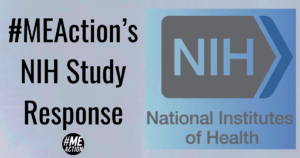The US National Institutes of Health (NIH) is hosting a telebriefing on Tuesday to “share information about [their] upcoming activities and to gather feedback” from the ME/CFS advocacy community. They have limited phone lines and said they want to make sure to address questions from representatives from community organizations and leaders, so the call is not open to the entire public, but the NIH asked that everything discussed be shared publicly. We have recommended that all future calls be open to the entire community – YouTube Live is one of several technologies that would not limit participation – and that the call be recorded.
#MEAction sent a list of questions to the NIH based on the comments gathered from the community on our site. Thank you to everyone who participated. We have asked that these questions be addressed during the call and on their website. We will be sending additional community questions soon but felt that these urgently needed to be answered.
Here are the submitted questions, summarized and collated (we have also sent a link to the original questions and comments in full):
- Patients have expressed strong concern about the selection of Dr. Brian Walitt as lead clinical investigator. He has written and spoken about ME/CFS and other illnesses being psychosomatic in spite of biological evidence to the contrary. Why was he chosen for the study?
- Patients have expressed similar concerns about Drs. Gill and Saligan. Why were they chosen for the study?
- NIH has chosen to compare ME/CFS patients to people with the controversial functional movement disorder. Why did NIH choose this group?
- NIH has chosen asymptomatic Lyme patients as another comparison group. Can you confirm that these patients are intended to be the post-infection, symptom-free group? How will NIH select these patients to make sure they are really asymptomatic and don’t have chronic Lyme?
- Why was Lyme infection chosen versus HHV6, EBV or other infections already suggested as a trigger to ME/CFS?
- Why was multiple sclerosis not chosen as a comparison group, as other recent ME/CFS studies have done? Would NIH consider replacing the FMD or Lyme Comparison groups with an MS group?
- Patients have expressed concerns that 40 patients is too small of a sample. Why did you choose this number? Would NIH consider dropping one of the comparison groups and adding in 20 more ME/CFS patients?
- How will ME/CFS patients be selected for the study? Walk us through the process and tell us which criteria and assessment tools will be used for patient selection and to validate the diagnosis.
- Will NIH share all data generated from the study with outside researchers?
- Will patients have access to their test results?
- Will NIH coordinate research plans with the ongoing study led by Dr. Ron Davis, who is studying severely ill, bedbound ME/CFS patients? It makes sense for NIH to leverage this private investment to maximize what is learned from both studies.
Photo by benjreay (CC BY-NC 2.0)






19 thoughts on “#MEAction's Questions for NIH's Intramural Study Team”
Honestly, it isn’t just questions at this point.
It is more like we have caught you trying to prove out that those you label with psychiatric issues and have FMD (which many of us do not believe to be psychiatric but instead a neurological and organic disease medical research has not figured out and they have been labeled as having psychiatric/physical mind body illnesses) and Dr. Lipkin who believes and is probably correct that some mental health issues are due to viruses (and has allowed FMD to be in this group) is no doubt using this study to help prove out his theories.
Parkinson’s, ALS or MS patients could have been used but they chose to have FMD patients labeled as psychiatric and they will use this to prove out Lipkin’s and Walitt’s theories and label ME/CFS patients with a neuro-immune psychiatric/physical mind body disease.
And all the advocates and journalists involved are just letting it happen instead of putting your foot down HARD.
Additionally, I believe the wrong group of doctors have been treating some mental health issues that are really neuro-immune diseases but since there are not enough neuro-immune specialists and never will be these patients will continue to be treated by psychiatrists and so will most ME/CFS patients.
Having post-Lyme is ridiculous and everyone knows it no matter how they spin it and how much journalists and advocates eat it up. And I bet these particular Lyme patients they will choose for this study will just happen to be suffering from mental health issues.
This asinine attitude of “it’s all in your head” by doctors cannot be tolerated! There ARE biological similarities between most patients! Natural killer cell dysfunction, POTS, other deficiencies and physical symptoms that cannot be simulated by “wrong thinking”! Yes, patients can be bed bound or functional, since it can remit and relapse. Or some patients never improve. It is a VERY complicated illness, so the medical community should just give up and ostracize patients? Label, defame and distance themselves because it makes them feel inadequate?!? Of course not! If they would start by hearing what patients are saying- it is a similar bleak story. Often they say “It all started with a flu-like illness. I was active and successful, but my life has never returned to normal. I am unable to do many things. The doctors don’t know what it is or what to do. Some have even been cruel and accusatory. Some push drugs on me so I won’t care I’m sick. I just want to be well and get my life back!” Most doctors don’t do the right tests and are ignorant. Care MUST be made available! Patients are waiting for some HOPE!
my words exactly Joanne….(above comment) Its like you took the words straight out of my mouth.
How can we possibly feel good about someone being the lead of this investigation and having such strong and IGNORANT views on our illnesss.. WE deserve real treatment from real drss, not more b.s.!
Does anyone understand why there will be limited phone lines so that only a few will be able to hear what’s being said?
Hi Sammy…they have a teleconference system with 100 phone lines available. ME Action and others have encouraged them to open up future teleconferences to everyone by using Youtube or some other open set-up.
Thanks, Brian. Do you know if they will open up the 100 lines they have this time?
Brilliant, thank you! 🙂
Excellent questions.
After 30 years of being mistreated and ignored, have we not earned the right to have our disease considered ON ITS OWN? The FIRST job is to run these tests – which do sound interesting – on ME/CFS patients and compare that to healthy normals. Since you don’t seem to have much money allocated for this, why spend any money at all on other conditions?
Second, haven’t we earned the right to no longer be considered somaticizing? What about the CPET studies and evidence of SPECT scan abnormalities? What about the numerous studies on natural killer cell dysfunction? I’d mention abnormal cytokines but since it seems to be a theory that abnormal cytokine behavior leads to mental illness, I’ll just drop that one for now – but I AM reminded of the endless efforts in the 1990s into the early 2000s to portray hormonal abnormalities as indications of mental illness … or, the other insulting assumption, “too many stressors leading to an inability to fight stress.”
Can’t they do a straight-up study on us without confounding it with other hypotheses?
What’s frustrating is that they are really going to do interesting things. It’s the utter cluelessness about who we are that is disturbing.
I think that is where these questions lead, and I am grateful.
For those who have not read it, this is my own open letter to NIH on the study:
http://slightlyalive.blogspot.com/2016/03/an-open-letter-to-dr-collins-and-dr.html
Hi Mary, it’s actually good science to include a disease comparison group.
It’s just really weird and not helpful to chose any disease that is not well characterized, doesn’t have good diagnostic procedures, and in such a small study, to have so many comparison groups by adding two other diseases.
My thoughts on those particular diseases can be found on a different page, e.g.
http://meaction.net/2016/02/12/usawg-submits-questions-to-the-nih/#comment-2095
best,
Janelle
The other problem, obviously, is the size. The more variables you introduce, the more participants you need to have to compensate for the fact that (particularly in a small group) you will doubtless find some associations due to chance alone.
There are statistical calculations that can estimate this, but I don’t think I can manage that at this time (or even manage telling excel to do the math).
With as many things as they are studying, add 2-3 patient groups, and the fact that some things probably don’t have a known normal value in healthy people, I would be surprised if it came out to less than 300 needed, though. I wouldn’t be surprised if the result was much more, even in the 4 digits.
Okay – after much thought – here is what I think we need to do:
We need to ask that they focus on ME and patients with a diagnosis of CFS. Be specific about how they are diagnosing.
We need to ask that they focus on ME/CFS ALONE. If they only have enough money to study 40 patients, don’t dilute it with other hypotheses. If they want to compare ME to other specialties – fine. In other studies.
Remind them there are over one million American adults with this disease and countless adolescents – remind them there has not been an in-house study in 20 years (of which I am aware). This isn’t that much money.
The science looks exciting. Spend it on us.
Also remind them that only 85% of American adults with ME/CFS – that would be 850,000 people – have a diagnosis. Since the majority of those WITH a diagnosis are white, upper middle class women, and since the best demographic studies have shown this is an equal opportunity disease when it comes to income and ethnicity, we can then guess who is in the 85% undiagnosed group.
It is too important, too urgent, and we owe it too much to 850,000 undiagnosed Americans, to waste any resources on alternate hypothesis. Stick to the disease.
Mary
ARGH (you need an edit function) – that’s 85% UNDIAGNOSED, 15% diagnosed.
My question would be are all of these questions necessary?
I think that much thought needs to be given about what the main points are and what can be trusted. For instance the question about how exactly patients are to be chosen, with detailed explanation requested. Since the patients are coming from ME/CFS expert clinician practices, could this question have been left to a later date since if the clinicians involved don’t know how to diagnose ME/CFS then who does?
I know there is a major question mark about the Empirical definition being referred to but I don’t see how the clinicians involved would either all of the sudden forget how to diagnose patients or to include patients against their better judgement. Perhaps it could just be requested that the Empirical definition be left out? I mean no group other than the CDC has ever used it, the CFSAC explicitly recommended against its use, the former CFIDS Assoc. publicly objected to its use, etc. It seems like the only reasons it would be included to begin with would be because a) the NIH investigators are ignorant of the field/literature on the disease, b) Beth Unger is a consultant to the study, and/or c) the CDC wants to give the impression that they haven’t wasted the past 10 years on their crap studies using the ED. For a fairly concise yet detailed analysis of the faults of the ED, check out the peer review on the 2007 study using the ED that claimed to raise prevalence rates 10x by none other than Peter White-
http://www.pophealthmetrics.com/imedia/1083914155124266_comment.pdf
Could ME Action record the call? It’s easy to do so with a smartphone or a VoIP line.
Best to have an account of what’s actually been said rather than people paraphrasing what they heard and different people communicating possibly different things.
Thank you for putting this together.
I thought that it was settled that patients would be provided by out experts. If this is not the case and Walitt is doing the selection that is truly scary. I don’t like that they s]are going into this with a hypothesis before they have done any real work with us yet.
Has anyone spoken with our expert on this? I’m sure they would be happy to make themselves available to these scientists who are new the our disease as a real disease.
My one suggestion would be to role play blow off answers or unacceptable answers and and hit back hard if the main concerns about this study are brushed off. The questions are all very reasonable and nice but at a certain point if they are responding in a way that shows they don’t understand or are not interesting in the need for a cleaner better study free from prejudice I hope advocates will tell them we will fight.
At what point do you say that is unacceptable? What recourse would we have?
I’ not trying to stir things up for the sake of it just saying hope for the best but be prepared for the worst. They always have a way of making what is bad for us sound so reasonable.
I’m getting a a big old case of deja vu after having gotten to this point so many times over the decades only to realize we got snowed again.
Have back up information and alternate statements at hand as it can be confusing in the moment.
Good luck.
I think these questions are good ones.
But i’m prepared for evasive answers tbh.
I don’t have a feeling they are ready & willing to make thorough changes where pwme Will be more comfortable with.
It’s a good thing to communicate & try to get changes that way. To start off diplomatically.
But when that step fails, i’m going with Janet (above). Putting our foot down HARD.
I can’t help but Comparing what NIH is planning with what Stanford is already doing.,
Take Mark Davis for instance.
Guys like him should be consulted by NIH.
It’s just Stupid not to do so if they mean business.
I think this is a very good list of questions. It would be a shame to dilute the statistical power of this study with irrelevant control groups.
Many people also, after receiving the standard course of antibiotics for a Lyme Infection, improve for a short while (for example, several months) and then relapse. It’s unclear to me how many people like this would “slip through.” In any case Chronic Lyme is an area of active controversy and would only make the study more difficult to interpret.
Why not use a well known illness-control such as M.S., as a control group as has been done in some prior studies?
Or, for a recovered control group, why not those who have recovered post-EBV or post-Flu?– many people with M.E. report first becoming ill after a flu-like illness. Knowledge could be gained via comparing in parallel those who didn’t recover post-“flu-like” infection with those who *did*.
Also concerning is that at least some of the prominent investigators, such as Walitt have apparent bias towards viewing disorders for which biological abnormalities are known (though not completely understood) as psychosomatic, including Fibromyalgia.
Given the circulatory issues in M.E. plus the immune system dysfunction why not include more MDs and MD/PHDS with a background in Cardiology, Immunology, Virology, Epidemiology etc?
Thank-you for the excellent list of questions and I would encourage all visitors (people with ME, friends, family, and NIH seeking to understand our concerns) to also visit Mary Schweitzer’s excellent blog, here:
http://slightlyalive.blogspot.com/2016_03_04_archive.html
Seems like an obvious question but not sure if anyone has asked :
Have the investigators consulted with Dr.s Fluge and Mella in terms of any testing they have done to date and their results. ?
Comments are closed.